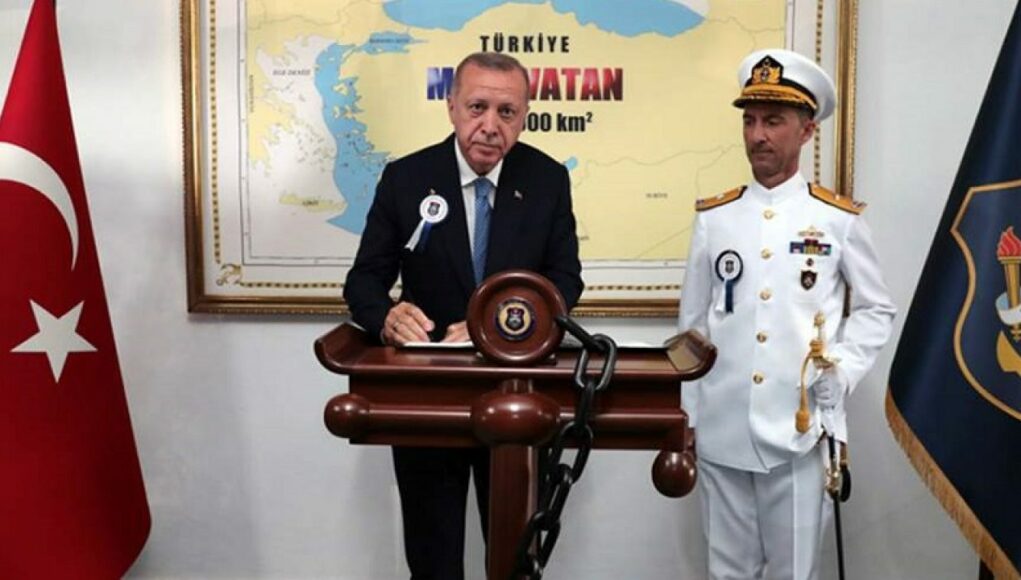A declaration released jointly by 104 retired admirals has brought civilian-military relations and coup speculation back into the limelight in Turkey. The admirals maintain that they have merely exercised their right to free speech, while the government is accused of seeking to score political points by interpreting the declaration as a hint at a putsch. The statement marked the most significant tension between President Recep Tayyip Erdoğan and a faction of anti-NATO admirals led by Cem Gürdeniz, who until recently had enjoyed close cooperation with the country’s strongman.
The declaration was published in the wake of remarks by Parliament Speaker Mustafa Şentop, who claimed that it was within Erdoğan’s power to withdraw Turkey from the Montreux Convention Regarding the Regime of the Straits, a 1936 treaty that gave Turkey control over the Bosporus and Dardanelles straits and regulates the transit of naval warships.
In the declaration the admirals underlined that the convention was a diplomatic victory instrumental in keeping the peace in the Black Sea and guaranteeing Turkey’s full sovereignty over the straits as well as the Sea of Marmara, which lies between them.
What made the retired naval officers anxious was a recent landmark move by Erdoğan to withdraw Turkey from another international agreement that had been ratified by parliament. Last month Erdoğan issued a decree announcing Turkey’s withdrawal from the Istanbul Convention, a treaty that combats domestic violence. Whether he had the authority to do so still remains a subject of debate among the country’s legal experts. Nevertheless, the development sparked another debate as to whether Erdoğan could use the same authority with the Montreux Convention.
The Montreux Convention is as critical for Russia as it is for Turkey. The group of signatories of the declaration are considered by the Turkish public to have pro-Russian views skeptical of Turkey’s traditional Western alliances, and they are often referred to as “pro-Eurasians.” They are also widely believed to be predominant in the country’s naval forces.
Gürdeniz, a well-known member of the group, is one of 10 admirals who were detained following the release of the declaration.
A former naval officer who spoke on the condition of anonymity points to the timing of the declaration, which came ahead of a visit to Turkey by EU Council President Charles Michel and European Commission President Ursula von der Leyen on April 6. Erdoğan, who for a long time has played a double game between Russia and the West, has now found himself in a bind as he is being compelled by both sides to make his choice, according to the former officer. Hence, the possibility of seeing Montreux dismantled is causing discomfort among anti-NATO officers.
Signatory admiral accused the US of undermining Montreux
Atilla Kıyat, one of the signatories of the declaration, claimed in a 2019 interview with the Sözcü newspaper that back in 2009, then-US Ambassador James Jeffrey had visited him and suggested violating the convention but that he had objected.
The quest for Kemalists’ support
Another notable detail in the declaration was a section about Adm. Mehmet Sarı, an active duty officer who recently made headlines with images of him taken at a religious cult center while praying in military uniform and with a turban on his head. The admirals denounced the images as unacceptable and contrary to the values promoted by Mustafa Kemal Atatürk, the founder of the Turkish Republic, in an apparent attempt at securing the support of the Kemalist elite.
Morale boost for the government
The declaration seems to have reinvigorated Erdoğan’s government, which has been bleeding public support in polls due to the country’s financial problems. In contrast to European countries, the government discontinued short-time working allowances and granted employers the right to give employees unpaid time off. While this was being debated nationwide, the admirals’ statement gave the government the chance to change the subject, and ruling party members came forward to make comments against what they described as a call for a coup. Pro-government journalists Cem Küçük and Rasim Ozan Kütahyalı urged the authorities to detain and arrest the admirals as well as whoever encouraged them.
Following the calls, police operations on Monday morning changed the country’s agenda, with the detention of 10 retired admirals — Ergun Mengi, Atilla Kezek, Alaettin Sevim, Ramazan Cem Gürdeniz, Nadir Hakan Eraydın, Bülent Olcay, Kadir Sağdıç, Türker Ertürk, Tugay Erdağ and Ali Sadi Ünsal — on the charge of conspiring to commit crimes against the security of the state and the constitutional order. Four retired admirals — Kıyat, Engin Baykal, Cemil Şükrü Bozoğlu and Mustafa Özbey – were not detained due to their advanced age but were ordered to present themselves at a police station within three days.
The government did not stop there and cancelled the signatory admirals’ right to state housing and a security detail in line with a call by Erdoğan’s far-right ally Devlet Bahçeli, who also called for a termination of the admirals’ pensions and a retroactive revocation of their rank of admiral.
A rift between Erdoğan and the anti-NATO group?
Since 2013 the anti-NATO faction has enjoyed growing cooperation with Erdoğan, which had started off amid growing tensions between the government and the faith-based Gülen movement. Their alignment became all the more visible after a failed coup in July 2016, which the government blamed on the movement, and with the ensuing mass purge of some 150,000 allegedly Gülen-linked public sector workers. After the mass removal of Gülen followers from state institutions, Erdoğan and the anti-NATO group were widely anticipated to have tensions. Doğu Perinçek, leader of the Homeland Party (VP), viewed as the poster child of the group, criticized the declaration and announced his continued support for Erdoğan’s rule.
Perinçek’s comments were interpreted as the sign of a split within the anti-NATO faction, between a group close to Perinçek that sees Erdoğan as the most suitable leader to drive Turkey closer to Russia, Iran and China, and another group comprising a number of retired officers who distrust Erdoğan due to his Islamist roots and believe they will be next in line to be sidelined by him.
While the declaration does point to a certain break, Erdoğan’s cooperation with the anti-NATO faction remains strong as Bahçeli, who is close to the group, continues to be an unwavering political partner for Erdoğan and the active duty officers continue to be in agreement with Erdoğan about Turkey’s purchase of a Russian-made S-400 missile defense system, which led to apprehension in NATO capitals. All in all, it is too early to suggest that Erdoğan has completely parted ways with the group.
An opportunity for Erdoğan
The declaration also presents Erdoğan with some advantages as his ruling Justice and Development Party (AKP) has been polling at around 32 percent, a record low since the party’s establishment, against the backdrop of economic troubles and the clumsy management of the COVID-19 pandemic. Some commentators have argued that the declaration has been a lifeline thrown to the party, allowing it to handle the Montreux debate with a focus on the coup narrative instead of the treaty itself. The government’s spokespersons and the pro-government media were quick to accuse the admirals of being coup plotters. In the past, such coup-related tensions were Erdoğan’s go-to argument for bringing back and rallying the country’s sizeable conservative and nationalist voter base whenever it was drifting away from his party.
By: Cevheri Güven
Source: Turkish Minute



